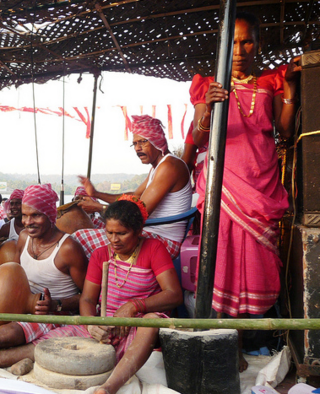Kunbi is a community in Maharashtra, India.
- Gauda and Kunbi, a people of Goa, India
- Kudumbi, a Konkani people of Kerala, India
Kunbi is a community in Maharashtra, India.
The Maratha caste is composed of 96 clans, originally formed in the earlier centuries from the amalgamation of families from the peasant (Kunbi), shepherd (Dhangar), blacksmith (Lohar), pastoral (Gavli), carpenter (Sutar), Bhandari, Thakar and Koli castes in Maharashtra. Many of them took to military service in the 16th century for the Deccan sultanates or the Mughals. Later in the 17th and 18th centuries, they served in the armies of the Maratha Kingdom, founded by Shivaji, a Maratha Kunbi by caste. Many Marathas were granted hereditary fiefs by the Sultanates, and Mughals for their service.

House of Scindia or earlier known as the Sendrak was a Hindu Maratha Royal House that ruled the erstwhile Gwalior State in central India. It had the Patil-ship of Kanherkhed in the district of Satara and was founded by Ranoji Scindia, who was sardar of maratha empire and real maratha warrior clan appointed by chattrapati shahuji maharaj-1's servant family from kokan worked as prime minister also known as Peshwa Bajirao I. Ranoji and his descendants, along with their rivals the Holkars, played a leading role during the Maratha ascendancy in northern India in the 18th-century. The Gwalior State became a princely state during the British Raj in the 19th and the 20th-centuries. After India's independence in 1947 and the abolition of princely states, several members of the Scindia Dynasty went on to enter Indian politics.

Shinde is a clan of the Maratha clan system variations of the name include Scindia and Sindhia, Sindia. It is found largely in Maharashtra (India), but it also appears in Indian states bordering Maharashtra like Madhya Pradesh, Gujarat, Karnataka, Goa, Telangana and Chhattisgarh.
The Bhonsle are a prominent group within the Maratha clan system.

Kunbi is a generic term applied to several castes of traditional farmers in Western India. These include the Dhonoje, Ghatole, Masaram, Hindre, Jadav, Jhare, Khaire, Lewa, Lonare and Tirole communities of Vidarbha. The communities are largely found in the state of Maharashtra but also exist in the states of Madhya Pradesh, Gujarat, Karnataka, Kerala and Goa. Kunbis are included among the Other Backward Classes (OBC) in Maharashtra.
Leva Patel is a sub-caste of Patidars in India, situated mainly in Charotar region of Gujarat. Compared to other Patidar subcastes such as the Kadavas, they had greater wealth and control of positions in commerce, education, and producer cooperatives.
The Maratha Clan System refers to the 96 Maratha clans. The clans together form the Maratha caste of India. These Marathas primarily reside in the Indian state of Maharashtra, with smaller regional populations in other states.

Khandeshi is an Indo-Aryan language spoken in the Khandesh region of north-west Maharashtra and also in Gujarat. It consists of Khandeshi proper, and the Dangri and Ahirani dialects. Kunbi and Rangari also are dialects. The Ahirani dialect of this language is mostly spoken. Devanagari script is used to write Khandeshi language. The words "Ahirani" and "Khandeshi" are sometimes used interchangeably: Ahirani as the caste-based name, and Khandesh as the region-based name. The Census of 1911, 1921 and 1931 counted the Ahirani speaking people as Gujaratis but in latter decades they have been recognized as a different language.
Bhavana Pundlikrao Gawali is a five-time Member of Parliament from Shivsena representing Yavatmal-Washim Lok Sabha and She is a daughter of senior Shiv Sena leader & former M.P Pundlikrao Gawali She is serving as a Member of Parliament for this constituency since 1999. She is currently the most senior Member of Parliament from Maharashtra.
The Kudumbi, also referred to as the Kunubis, the Kurumbi, or the Kunbi, are traditionally a Konkani-speaking farming community residing in Kerala, India. They are a branch of the kudumban/kudumbiyar(Devendra Kula velalar) of Tamilnadu.
Manickpur is a small village in the Vasai (Bassein) township of the Palghar district in the Maharashtra, India.
Hatkar, also known as Bargi Hatkar is warrior caste found in Deccan region of India. Their home language is Marathi. However, Bargi is a distinct sub-caste from Hatkar Dhangar.They are a Maratha tribe.

The Mali are an occupational caste found among the Hindus who traditionally worked as gardeners and florists. They also call themselves Phul Mali due to their occupation of growing flowers. The Mali are found throughout North India, East India as well as the Terai region of Nepal and Maharashtra. Iravati Karve, an anthropologist, showed how the Maratha caste was generated from Kunbis who simply started calling themselves "Maratha". She states that Maratha, Kunbi and Mali are the three main farming communities of Maharashtra – the difference being that the Marathas and Kunbis were "dry farmers" whereas the Mali farmed throughout the year.
Mavala was a name used for people of the hilly Maval region west of the present day Indian city of Pune. It was in the Maval that the 17th century Maratha leader, Shivaji, first established his power base that later developed into the Maratha kingdom. The inhabitants of this hilly region who were heavily enlisted in his guerrilla forces and raiding bands were known as Mavale, composed of the Kunbi castes. The Mavala soldiers were expert footmen and excelled in mountain warfare. The infantry was considered the backbone of Shivaji's power, and according to Sabhasad Bakhar, which chronicled Shivaji's life, the Mavale Hasham infantry of Shivaji was composed of 100,000 men.
Kamble is a Marathi Indian surname commonly used by communities residing in Maharashtra. The word "kamble" is literally translated as "cotton blankets" likely adopted by those who were cotton farmers and weavers in the region of Vidarbha.; though there also existed clan, namely Sonkamble, and this could be its derivation, too.
Kale, sometimes spelt as Kayle or abbreviated from Kalen, is a Gaelic unisex given name, although it is more commonly given to males.

Gaudas are aboriginal people residing in the coastal Indian state of Goa. They are believed to be the original inhabitants of Konkan. Most follow folk Hinduism, but many were converted to Catholicism by the Portuguese missionaries during the Christianisation of Goa while still keeping their folk tradition and culture alive.
The Dhawad are a Tirole-Kunbi community found in the Indian state of Maharashtra. The Dhawad are a Kunbi Tirole caste. The Kunbi Tirole are an agricultural community found in the Khandesh region of Maharashtra. The community believe that they are Rajputs who migrated from Rajasthan as a result of a general migration of the tribes of Rajputana. The community speak Marathi.
Tilori Kunbi is an agricultural, landlord community in the Konkan division and Vidharba of the Indian state of Maharashtra.
Rai-Sankli is a village and former petty princely state on Saurashtra peninsula in Gujarat, western India.